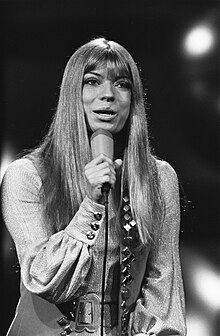Katja Ebstein

Katja Ebstein | |
|---|---|
 Ebstein in 2016 | |
| Background information | |
| Birth name | Karin Witkiewicz |
| Born | 9 March 1945 Girlachsdorf, Germany (now Gniewków, Poland) |
| Genres | Schlager |
| Occupation | Singer |
| Years active | 1969–present |
Katja Ebstein (born Karin Witkiewicz; 9 March 1945) is a German singer. She was born in Girlachsdorf (now Gniewków, Poland). She achieved success with songs such as "Theater" and "Es war einmal ein Jäger". She was married to Christian Bruhn, who wrote many of her songs.
Ebstein represented Germany at the Eurovision Song Contest three times, in 1970, 1971 and 1980. She also took part in Ein Lied für Stockholm in 1975 with the song "Ich liebe dich", placing 5th in the selection. Her best performance was in 1980 when she gained second place with the entry "Theater", her other two songs "Wunder gibt es immer wieder" and "Diese Welt" each came to third places. As noted by John Kennedy O'Connor in his book The Eurovision Song Contest – The Official History,[1] Ebstein is the most successful performer to have taken part in the contest without ever winning. She is the only singer to appear in the top three on three occasions, without winning.
Discography
[edit]

Albums
[edit]| Title | Album details | Peak chart positions |
|---|---|---|
| GER [2] | ||
| Katja |
| — |
| Wunder Gibt Es Immer Wieder |
| — |
| Mein Leben ist wie ein Lied |
| 11 |
| Freunde |
| 44 |
| Katja Ebstein en español |
| — |
| Wir leben |
| — |
| Katja |
| 37 |
| ...Was ich noch singen wollte |
| 43 |
| The Star of Mykonos |
| — |
| Wilde Rosen Und Andere Träume |
| — |
| Katja Ebstein singt Heinrich Heine |
| — |
| Katja & Co. |
| — |
| In Petersburg ist Pferdemarkt |
| — |
| Liebe |
| — |
| So Wat Wie Ick Et Bin... |
| — |
| Glashaus |
| 19 |
| He Du Da ... |
| — |
| Kopf Hoch |
| — |
| Traumzeit??? |
| — |
| Lyrikerinnen (with Lutz Görner) |
| — |
| Ich Rutsche Auf Der Rutsche (with Lila Lutsche) |
| — |
| Ebstein |
| — |
| Witkiewicz |
| — |
Charted singles
[edit]| Year | Title | Peak chart positions | ||
|---|---|---|---|---|
| GER [2] | AUS [3] | SWI | ||
| 1970 | "Wunder gibt es immer wieder " | 16 | — | — |
| "Und wenn ein neuer Tag erwacht" | 28 | — | — | |
| 1971 | "Diese Welt" | 16 | — | — |
| "Ein kleines Lied vom Frieden" | 47 | — | — | |
| 1973 | "Der Stern von Mykonos" "The Star of Mykonos" | 4 | 6 | 2 |
| 1974 | "Ein Indiojunge aus Peru" | 22 | — | — |
| "Athena" | 30 | — | — | |
| "Es war einmal ein Jäger" | 4 | — | — | |
| 1975 | "Die Hälfte seines Lebens" | 25 | — | — |
| 1976 | "Aus Liebe weint man nicht" | 48 | — | — |
| "In Petersburg ist Pferdemarkt" | 38 | — | — | |
| 1980 | "Abschied ist ein bißchen wie sterben" | 10 | — | — |
| "Theater" | 11 | — | — | |
| "Dann heirat' doch dein Büro" | 30 | — | — | |
References
[edit]- ^ O'Connor, John Kennedy. The Eurovision Song Contest – The Official History. Carlton Books UK 2007. ISBN 978-1-84442-994-3
- ^ a b "Offizielle Deutsche Charts Suche Katja Ebstein". Offizielle Deutsche Charts (in German). Retrieved 18 September 2024.
- ^ Kent, David (1993). Australian Chart Book 1970–1992 (illustrated ed.). St Ives, N.S.W.: Australian Chart Book. p. 100. ISBN 0-646-11917-6.